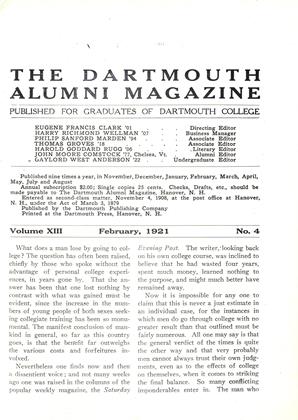Through a co-operative arrangement between the Thayer School and the Tuck School, the second year students in each school will be given courses in the other school. The Thayer School students, will take work in the Tuck School in Business Organization and Management, Marketing, Finance, and Accounting. Tuck School students preparing for certain fields of business may take work in the Thayer School in those engineering subjects which have been found most useful in the management of industrial enterprises.
"The adoption of this plan marks the beginning of an educational development which opens up far-reaching possibilities in the work of both the Thayer School and the Tuck School. In the past, the business problems presented by engineering projects were likely to be considered distinct from, and subordinate to, the purely technical problems with which the engineer was primarily concerned. It was but natural, therefore, that the business side of engineering was given scant place in the work of the engineering schools. Indeed, until very recent years, instruction in business administration had not been developed to the point where it could be made available to engineering students.
Under present conditions of engineering, practice business problems of great importance are inseparably involved with the work.of the engineer and he must asume responsibility for them. It is true that many eminent engineers have earned success largely through their ability to cope with such problems and through their skillful administration of business affairs. For such business training, as he has acquired, however, the engineer has had to draw on the hard lessons of practical experience. Now that it is made possible for him to receive instruction in the fundamental principles and modern methods of business, as a part of his engineering training, he should be better prepared than formerly for the needs and opportunities which he will meet in the practice of his profession.
To the business man, a knowledge of engineering principles and terms is often a valuable possession; an many fields it is an essential. Moreover, engineering methods are being brought to bear in many branches of business on problems ordinarily considered to be far removed from the province of engineering. In fact, many of the most substantial contributions to the science and art of business management must be credited to engineers whose work has led into industrial or commercial pursuits. Students of business administration have much to gain from a better understanding of the point of view and methods of engineering science.
The reciprocal use of facilities by the Thayer School and the Tuck School is an evidence of inherent soundness in the educational policy of the College. The plan of organization of both schools is similar.
Their common purpose is to give in their respective fields professional training of the highest grade. Each is concerned with the quality rather than the quantity of its product. Without encroachment upon the broadly liberal work of the College, their requirements for admission, undoubtedly exert a wholesome influence upon the quality of undergraduate scholarship. Whatever promise the new plan of co-operation holds for strengthening the work of the two schools, nothing of the traditional purposes of the College is yielded. It is not too much to expect that in time experience will point the way to even greater possibilities of educational usefuless that can at present be definitely forseen."
 View Full Issue
View Full Issue
More From This Issue
-
 Article
ArticleWhat does a man lose by going to college ?
February 1921 -
 Article
ArticlePEN AND CAMERA SKETCHES OF HANOVER AND THE COLLEGE BEFORE THE CENTENNIAL
February 1921 By EDWIN J. BARTLETT, '72 -
 Sports
SportsBASKETBALL
February 1921 -
 Article
ArticleTHE LOG OF THE DARTMOUTH OUTING CLUB
February 1921 By LELAND GRIGGS '02 -
 Sports
SportsHOCKEY
February 1921 -
 Article
ArticleA DARTMOUTH PIONEER
February 1921








